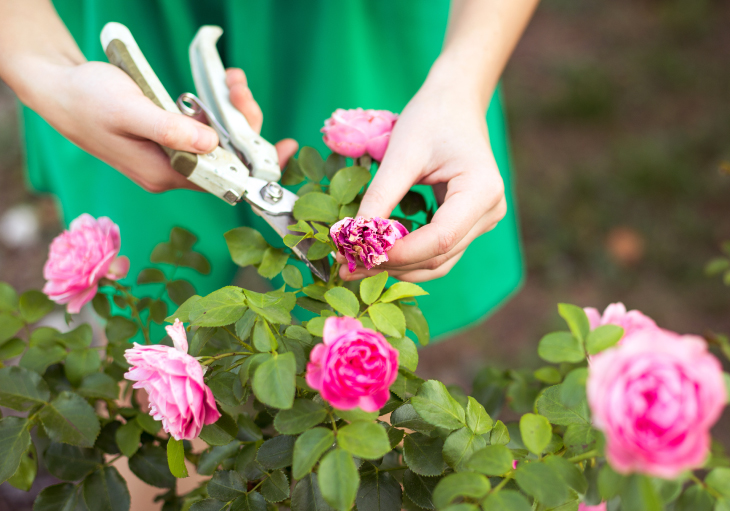Water roses regularly in summer. Well-grown roses need a lot of water, don’t let the soil dry out completely, if you see dust on the ground, it’s very water-deficient. For flowers that have been transplanted from seed trays into grow bags or raised garde beds, choose the frequency of watering according to the conditions in your area, usually need to be thoroughly watered once a week.
Fertilize. Roses usually require several fertilizations each growing season. In early spring, when you see new shoots appear, you can apply fertilizer, either liquid or granular. Fertilizer needs to be applied again at the first flowering, and again if there is a second flowering. After summer is over, which is Labor Day, you can stop fertilizing. Some fertilizers have a slow-release effect, so you don’t need to fertilize too often.
Don’t over-fertilize, or you may also cause damage to the flowers.
Trim the branches and leaves. Pruning the foliage will keep the blooms looking good and healthy. Where the foliage is too dense, some pruning is required to prevent rot or disease of the flowers. There are different types of hand pruners, so method of pruning varies by season, but the area for pruning the branches and leaves is fixed: from where the buds emerge, where the branches and leaves stick out. There is usually a small round block above a large clump of leaves that can be trimmed down diagonally.
Roses are not easy to be cut off, because new shoots must grow from the latest flower buds. You only need to choose the right place to prune, otherwise the newly grown leaves will affect the shape of the entire flower. Remember that the trick with pruning is to cut off the new shoots that are growing out and keep the air flowing inside the flower.
Remove dead foliage in late winter and early spring. If there are new branches and roots extending from the main trunk, clean up these derived branches and leaves to prevent the nutrients from the main trunk from being robbed. Keep about 8 flowers and cut off 1/3 of the height of the branches and leaves, which can make the bouquet grow better in warmer weather.
Take care to clean up dead flowers in summer, which will allow new blooms to bloom better.
Take care to add the necessary protective measures to the flower bushes throughout the winter. Excessive blooms can be damaged by strong winds or frost in winter. Keep the height of the flowers no more than 1.2 meters. Tie up with twine and be prepared for possible bad weather. Use compost as a protective base at the bottom of the bushes and cover with a layer of straw. When the temperature rises above 14 degrees Celsius, the protective seat can be removed.
Wash away aphids and spiders from flowers with water. This pest occurs in most rose species, and washing with water is the most effective way to get rid of it. In addition, making sure to water your flowers well can also reduce pest infestations
- Use less pesticides. Insecticides are likely to cause damage to your roses as well as other plants in your garden, as well as kill some other insects that are good for plant growth.
- Clean up leaves that have withered in time.
- If the infestation is still not completely removed, try making a mixture of dish soap and water and spray it on the leaves once a week.
- You can also buy some natural rose oil insecticide and spray it on the leaves, which will keep the infestation at bay without harming the beneficial insects.
Be careful not to get black spot or powdery mildew on your roses. Choose rose varieties that are resistant to these diseases, such as “Charming Rose.” You can also spray with fungicide at the beginning of each season, which can also be effective in controlling disease. You can also consult with an area nursery to find out seed trays what is the most effective way to eradicate the disease in your area.
Tip:
- A good irrigation system is important because roses are very sensitive to the amount of water.
- Good pruning can give your garden a whole new look and your house will get its best look.
- If you like, add a little lemon juice to the water when you water the roses on a sunny day.





